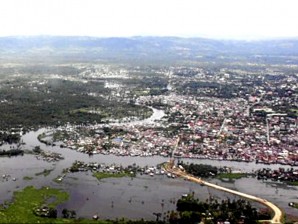
Low lying areas of Cotabato city submerged with flood water due to continues heavy downpour, the thick green color is the water hyacinth. Contributed photo
COTABATO CITY, Philippines—The military commander supervising the removal of thick vegetation—mostly water hyacinths—clogging the Rio Grande de Mindanao has called for more volunteers as floodwaters here continued to rise “by the minute.”
“This is alarming and we need every available human and material resource to contain it,” said Brigadier General Rey Ardo, commander of the Army’s 6th Infantry Division. “Let’s work, whether outside help or no help comes along. This is the time to save our own skin through bayanihan.”
Ardo said he already has ordered the deployment of more soldiers to help in clearing the Rio Grande of debris.
About 500 soldiers armed with machetes, shovels, crowbars and power cutting tools have been removing tons of water hyacinths and other debris that the authorities claim have been clogging the flow of water from the river to the sea.
Heavy rains over much of Mindanao have caused the Rio Grande to overflow its banks, flooding 33 of Cotabato City’s 37 barangays and villages, and about a dozen more in nearby Sultan Kudarat and Sultan Mastura towns in Maguindanao.
Similar flooding has affected villages in North Cotabato where the Rio Grade de Mindanao passes.
Cotabato Archbishop Orlando Quevedo said the declogging efforts appeared to be working but the problem was that more plants were being carried from upstream.
Cyclone and monsoon induced rains were primarily causing the Rio Grande and other rivers to swell and inundate low-lying areas.
As of Saturday, 25,375 families had been displaced in Cotabato City alone, officials said.
In nearby areas, particularly in Maguindanao and North Cotabato, the government of the Autonomous Region in Muslim Mindanao reported that there were also about 30,000 families displaced by the floods caused by the overflowing Liguasan Marsh.
Water hyacinths, often erroneously called water lilies, were also supposedly slowing down the flow of water from the swamp to the sea.
Zenaida Laidan, director of the Department of Science and Technology in Central Mindanao, said they were studying the possibility of gathering the hyacinths for their fibers, which may be used in the making of mats, baskets and other handicrafts that could be a source of livelihood for the locals.
But in the meantime, Ardo said, the immediate concern was to ease the woes of the residents by clearing the waterways.
Cotabato City Mayor Japal Guiani Jr., chair of the local Disaster Risk Reduction and Management Council, said the sight of civilians working alongside soldiers in the declogging efforts was inspiring.
ARMM Executive Secretary Naguib Sinarimbo said residents were determined to declog the river despite the lack of equipment.
He agreed with Ardo that more volunteers should join the effort.
“The floodwaters are getting deeper every day; the deepest in some villages reaches five to six feet,” said Halima Satol, city government information chief.
Because of the flooding, sports, cultural and other festivities in connection with city’s founding anniversary on June 19 had to be called-off, according to Aniceto Rasalan Jr., the city’s program coordinator.
“We were forced to reset the scheduled kite-flying festival today (Saturday) and other outdoor games until such time as the skies clear-up,” he said.
Interior Secretary Jesse Robredo, who made a surprise visit here Friday, told local authorities that he already requested his counterpart from the DPWH central office to dispatch with urgency available backhoes and barges.
Bashir Ibrahim, city district engineer, said the regional office of the Department of Public Works and Highways in Central Mindanao has custody and control of the multi million-funded Mindanao flood-control project.
“There’s money for fuel and the problem lies with the availability of barges that would haul tons of waterlilies,” he said.
A Moro rebel official said more should be done to address the perennial problem on flooding aside from the declogging activities.
“It’s a failure. The effort was not enough to contain the problem. We need concrete efforts this time to address our flooding problems,” MILF spokesman Eid Kabalu told the Inquirer by phone.
Kabalu said the government should conceptualize a program that would permanently address the problem.
Quevedo, chair of the Mindanao River Basin Task Force, said the declogging efforts were also being hounded by issues of irregularity in the disbursement of funds.
“We have included this in our report to the President, but this is not the time to blame one another during these trying times,” said the prelate.
Colonel Prudencio Asto, spokesperson of the military’s 6th Infantry Division, sided with Quevedo on this, adding that floodwaters will submerge the entire city of Cotabato in no time if the authorities failed to remove tons of water hyacinths from the country’s second largest river, the Rio Grande de Mindanao.
In Sta. Cruz, Davao del Sur, heavy rains also triggered almost daily floods that have so far displaced 100 families.
The floods, Mayor Joel Ray Lopez said, also regularly stalled traffic.
With reports from Jeoffrey Maitem and Orlando B. Dinoy, Inquirer Mindanao